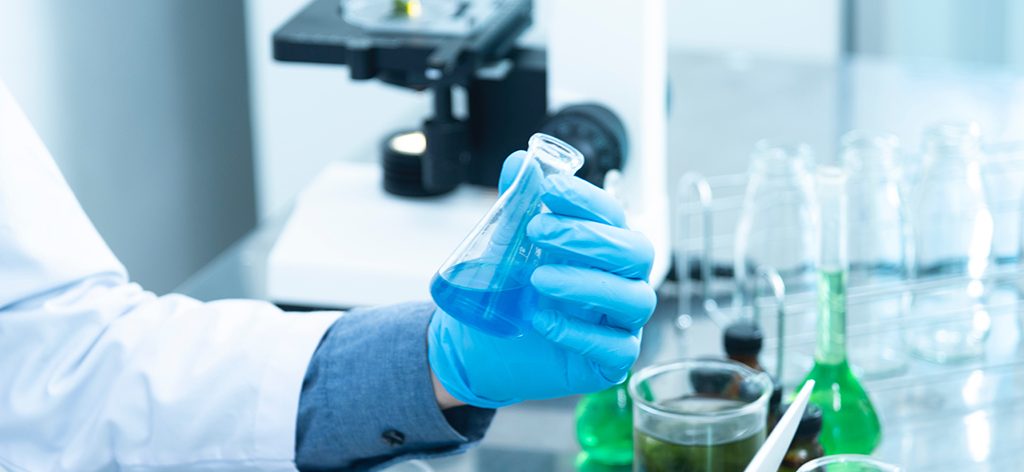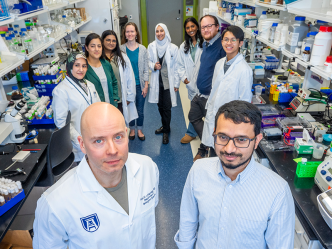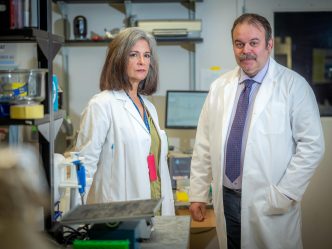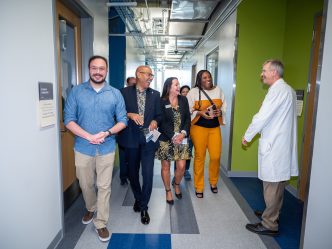In response to the COVID-19 pandemic, Augusta University will initiate a series of guidelines to “ramp down” research at AU, as is being done at other leading universities in Georgia and throughout the United States.
As detailed below, effective at 5 p.m. Tuesday, March 24, only essential laboratory and human subject activities will be allowed on the AU campuses and affiliated sites. Rare exceptions will be allowed on a case-by-case approval. All non-essential research should move to remote/virtual communications with research participants (i.e., phone, WebEx, webinar, online, etc.).
For essential ongoing studies, investigators should convert all activities to virtual interactions. If possible, limit remaining in-person encounters to those activities that will directly benefit the health and wellbeing of the participant. Face-to-face activities can include medications, disbursements/ administration, and safety/toxicity assessments. To the extent possible, even these functions should be virtual if possible or alternatively delayed to a later time, if they are not critical to the health and wellbeing of the participants. See the affiliated guidance document.
No new laboratory or human subject research projects should be initiated unless they meet the definition of essential research below. They must also have the explicit approval of their college/school dean and provide notification to the senior vice president of research via the New Research Proposals form.
Essential research
For the purposes of this guidance, essential research and activities are defined to include the following:
Essential laboratory and animal research:
- Viability of living organisms, including critical cell cultures
- Maintenance of unique reagents and molecules
- Maintenance of essential equipment
- Viability of unique animal strains
- Those in vitro and laboratory experiments in which cessation of research would result in the critical loss of months of animal/materials/data work and efforts
- COVID-19 related research
Essential human subject research:
- Clinical studies using drugs, biologics, or devices with the potential for a direct benefit to the research participant.
- A clinical study which involves therapeutic radiation
- COVID-19 related research
- Emergency humanitarian use (compassionate care) studies.
Non-essential research
For the purposes of this guidance document, non-essential research is defined to include the types of research identified below. These activities should not be conducted in person (face-to-face) but can be conducted virtually and/or remotely from the research participant.
Laboratory and animal research:
- Laboratory assay and imaging procedures
- Standard in vitro experiments which are not essential
- Standard animal experiments which are not essential
Human subject research:
- Observational, behavioral, and educational studies
- Survey research
- Focus groups
- Interventional studies that are not viewed as critical to the health and wellbeing of the research participant
- Physiological assessments
Unaffected research
Research that is not affected by this guidance document and is allowed to continue with no participant contact, which can often be conducted from home, includes:
- Chart reviews
- Retrospective data examination
- Archival data examination
- “Big data” computer analysis
- Development of new grant submissions
- Manuscript preparation and writing
- Statistical analysis of data
- Development of unit or laboratory standard operating procedures
- Literature reviews
- Thesis preparation
- Calculations and modeling
- Creating or updating training documents
Continuation of essential research
Investigators should limit the continuation of essential research if possible. For essential laboratory research, each investigator is limited to the involvement of only themselves and one other lab member. Thus, no more than two individuals per investigator (not per project) will usually be allowed. For PIs with multiple funded NIH projects, an additional person will be permitted for each additional funded study.
Laboratory/basic science investigators conducting essential research will receive approval from their department/institute/chair/director, and provide notification to their college/school dean and the senior vice president for research by completing the Essential Research form.
For essential human subject research, visits should be conducted virtually remotely whenever possible. Human subject research investigators who will be conducting essential human subject research will receive approval from their college/school dean with notification to the senior vice president for research by completing the Essential Research form. Any investigator who plans to initiate a new essential research project must receive all usual approvals (e.g., IRB, IACUC, biosafety, etc.) and must also receive approval from their dean and the senior vice president for research. Similarly, any investigator desiring an exception to the guidelines in this communication must receive pre-approval from their college/school dean and the senior vice president for research.
If an investigator believes their research is essential or they are requesting the review of their study for continuation, please complete the Essential Research form to notify leadership of these ongoing activities.
Research and research-related unit statuses
In general, research and research-related offices are all continuing to function. This includes telework whenever possible. Please feel free to contact the units for any assistance with your research activities. Specific status information regarding research and research–related offices and services, along with contact information, are listed below:
- Sponsored Programs Administration (DSPA)
- Institutional Review Board (IRB)
- Laboratory Animal Services (LAS)
- Institutional Animal Care and Use Committee (IACUC)
- IACUC meetings are continuing virtually as scheduled.
- Research Development Services (RDS)
- All services are ongoing, often virtually.
- Clinical Trials Office (CTO)
- Many activities have been postponed or are ongoing virtually. Essential studies are ongoing.
- OnCore Clinical Trial Data Management Services
- Core services are being provided virtually.
- Conflict of Interest (COI) Committee
- The committee continues to meet virtually.
- Assistance can be obtained by contacting 706-721-0900 or email.
- Environmental Health and Safety Division (EHS)
- Committee meetings will continue as scheduled, meeting virtually.
- EHS Division remains open for business. Research staff can contact us at any time with questions
- EHS Division will continue to pick up hazardous chemical waste from laboratories.
- EHS Division will continue to respond to incidents and accidents in laboratories
- All EHS committee approvals (IBC, ICC, RSC) are continuing on a virtual basis.
- EHS Laboratory Assistance Visits (LAVs) are suspended until further notice.
- Safety training such as the chemical safety training which is offered monthly in a didactic format are suspended and will re-start when in-person instruction resumes
- Office of Innovation and Commercialization
- Services are continuing virtually, including CDAs, MTAs, DUAs, and processing of invention disclosure submissions. The office is continuing to work with patent attorneys.
- Core Laboratories
- Core Laboratory Services are also “ramping down” non-essential services while continuing essential services on Individual Cores, case by case basis. Investigators should reach out to the core directors directly to identify availability and make arrangements.
Future guidance and questions
The COVID-19 pandemic is resulting in rapidly evolving developments that will require modifications to the guidance provided in this correspondence. AU Research will be providing additional guidance and will also develop FAQs to share. If you have research-related questions, please email them.
Please continue to check our dedicated COVID-19 resource page for updates.
 Augusta University
Augusta University




